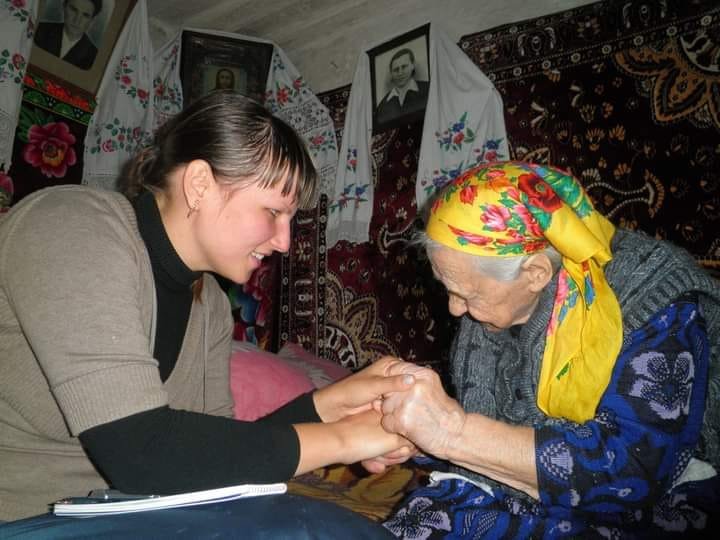Це правдива історія, яку, можливо, колись екранізують...
Події відбувались на початку 2000-х років, коли молоді люді ходили від села до села в центрі України, щоб знайти стареньких людей, аби записати від них інформацію про минувшину та давні українські пісні та обряди.
This is a true story that may one day be made into a film...
The events took place in the early 2000s, when young people went from village to village in the center of Ukraine to find old people in order to record information from them about the past and ancient Ukrainian songs and rituals.

В одному з сіл їм порадили знайти бабусю, яка перебувала на той момент в будинку для літніх людей і нещодавно відзначила своє 100-річчя. З долею скепсису, враховуючи вік старенької, вони пішли з нею познайомитись.
In one of the villages, they were advised to find a grandmother who was at that time in a home for the elderly and had recently celebrated her 100th birthday. With a lot of skepticism, given the old woman's age, they went to meet her.

Перше враження від спілкування - бабуся при світлому розумі та з чудовою пам'яттю, хоча фізично вже була дуже слаба. І от перші питання молодих людей відкрили нестримний потік інформації початку ХХ ст.
The first impression from the conversation was that the grandmother was bright minded and had an excellent memory, although physically she was already very weak. And so the first questions of young people opened an unstoppable flow of information from the beginning of the 20th century.

Бабуся згадала все своє дитинство - дитячі ігри та розваги, хороводи у супроводі веснянок, власне веснянки (яких в цій місцевості вже ніхто не пам'ятав), весільний обряд та весільні пісні, кілька десятків давніх пісень та іншу важливу інформацію.
Grandmother remembered all her childhood - children's games and entertainment, dances accompanied by spring songs (which in this area no one remembered anymore), wedding ceremony and wedding songs, several dozen old songs and other important information.

Оскільки під час сеансу було витрачено всі аудіокасети, які були в запасі, довелось з бабусею тимчасово розпрощатись, аби з'їздити додому поповнити запас касет та опрацювати записаний матеріал, адже бабуся надала таку унікальну інформацію, яку не фіксували в цій місцевості жоден з науковців.
Since all the audio cassettes that were with them were used up during the session, the young people had to temporarily say goodbye to their grandmother in order to go home to replenish the supply of cassettes and process the recorded material, because the grandmother provided such unique information that was not recorded in this area by any of scientists

Під час прощання бабуся сказала: "Дітки, приїздіть до мене ще, я вам ще так багато маю розказати та наспівати, як раз позгадую ще пісень, поки ви приїдете".
During the farewell, the grandmother said: "Children, come to me again, I still have so much to tell and sing to you, I will remember more songs before you come."

До цієї бабусі ці молоді люди приїжджали ще пару раз і працювали з нею по кілька днів. Бабуся мала настільки унікальну пам'ять, що складні багатоголосні пісні вона співала по пам'яті кожен голос окремо. Звісно, голос в неї був дуже слабенький, але для наукового опрацювання матеріалу цьог було цілком достатньо, аби відтворити пісенну традицію цілого регіону.
These young people came to this grandmother a couple more times and worked with her for several days. Grandma had such a unique memory that she sang complex polyphonic songs from memory, each voice separately. Of course, her voice was very weak, but for the scientific processing of the material it was quite enough to reproduce the song tradition of the entire region.

І от настала та зустріч, коли бабуся сказала: "Оце я вам, дітки, передала все, що знала. Я дуже довго чекала і сподівалась комусь передати свої знання і тепер, знаючи, що ви все записали і це все збережете, я можу спокійно помирати"...
And then the meeting came, when the grandmother said: "Here I am, children, I have passed on everything I know. I have been waiting for a very long time and hoped to pass on my knowledge to someone, and now, knowing that you have written everything down and will keep it all, I can calmly to die"...

Вона і справді померла через декілька днів, але той масив знань, який вона зберігала в пам'яті все своє життя сьогодні живе у наукових статтях етнографів та фольклористів, давні пісні стали частиною нотних збірників та входять до репертуару багатьох українських фольклорних гуртів.
She really died a few days later, but the mass of knowledge that she kept in her memory all her life lives on today in the scientific articles of ethnographers and folklorists, ancient songs became part of music collections and are included in the repertoire of many Ukrainian folklore groups.

А хто такий етнограф? Це та людина, яка стала містком передачі традиційної культури від покоління яке пішло, до майбутніх поколінь. 17 липня в Україні відзначали День Етнографа і хочеться щиро подякувати цим людям за їхню неймовірно важливу роботу...
And who is an ethnographer? This is the person who became a bridge for the transmission of traditional culture from the past generation to future generations. On July 17, Ukraine celebrated Ethnographer's Day, and we would like to sincerely thank these people for their incredibly important work...

This is amazing. Elderly people used to be highly respected because of knowledge they had access to and could share with others. Now, since we have books, films and internet people think there is no longer need for telling stories and singing songs, but they are wrong. This is only way for some real truth to survive in my opinion. Great story.
Thank you very much for the feedback.